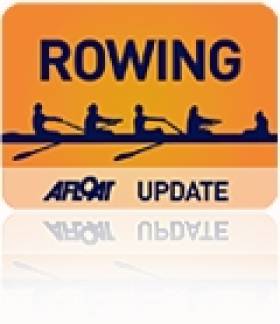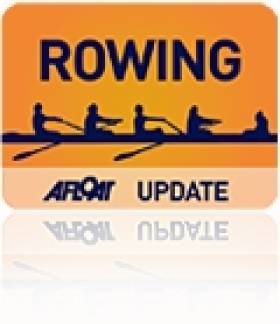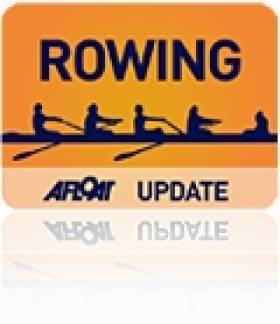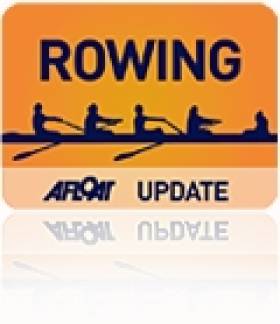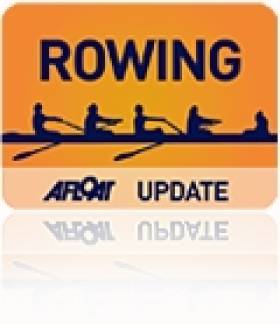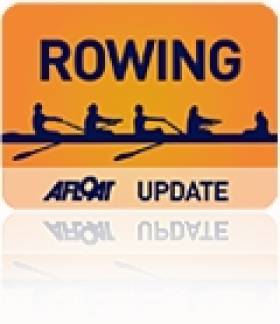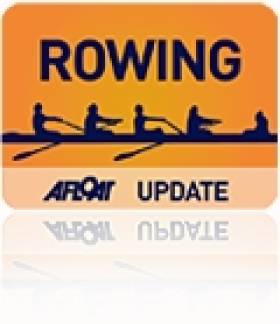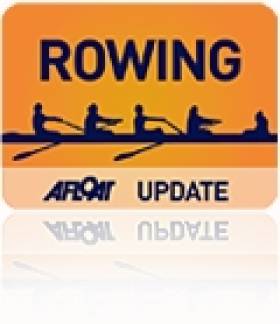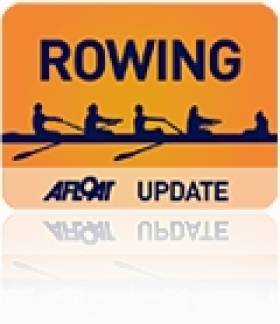Displaying items by tag: Puspure,
Ireland Olympian Sanita Puspure is Afloat Rower of the Month
# ROWING: Sanita Puspure is the Afloat Rower of the Month for August. The Cork-based athlete overcame an illness prior to the Olympic Games at Eton Dorney and represented Ireland well. She was unlucky to be drawn in an extremely tough quarter-final, where she finished fourth in a race won by eventual Olympic Champion Mirka Knapkova. Puspure won the C Final well, placing her 13th overall at her first Olympic Games, and suggesting that her ambitions of climbing the world rankings are well-grounded.
Rower of the Month awards: The judging panel is made up of Liam Gorman, rowing correspondent of The Irish Times and David O'Brien, Editor of Afloat magazine. Monthly awards for achievements during the year will appear on afloat.ie and the overall national award will be presented to the person or crew who, in the judges' opinion, achieved the most notable results in, or made the most significant contribution to rowing during 2012. Keep a monthly eye on progress and watch our 2012 champions list grow.
Puspure Ends Well at Olympic Rowing Regatta With Win in C Final
# ROWING: Sanita Puspure won the C Final of the women’s single sculls with great ease at the Olympic Games regatta at Eton Dorney today, placing her 13th overall. Micheen Thornycroft of Zimbabwe showed well early on, but Puspure took over in the second quarter of the race and had a clear one-length lead by 1250 metres. She then pushed on to win by almost eight seconds.
The A Final winner was Mirka Knapkova of the Czech Republic. Silver and bronze went to Fie Udby Erichsen of the Denmark and Kim Crow of Australia.
In an interesting twist, the Olympic Qualification Regatta in Lucerne had been a good indicator of form at Eton Dorney. Crow had won there, while Erichsen had finished second. Genevra Stone of the United States, who was third in Lucerne, won the Olympic B Final (seventh overall), while Puspure was fourth in Lucerne. Crow had a great Olympics, taking silver in the double sculls.
Olympic Games Regatta, Eton Dorney (Irish interest)
Women’s Single Sculls – C Final (places 13 to 18): 1 Ireland (S Puspure) 7:59.77, 2 Zimbabwe (M Thornycroft) 8:07.52, 3 Cuba (Y Cobas Garcia) 8:14.59, 4 El Salvador 8:19.75, 5 Thailand 8:34.11, 6 Brazil did not start. A Final: 1 Czech Republic (M Knapkova) 7:54.37, 2 Denmark (FU Erichsen) 7:57.72, 3 Australia (K Crow) 7:58.04.
# ROWING: Sanita Puspure had a great start and battled hard in the toughest quarter-final of the single scull at the Olympic Regatta. However, a fourth-place finish left her one place outside the mix for the A/B semi-finals.
Puspure actually led off the start. Mirka Knapkova, the reigning World Champion, had taken over by 500 metres, but Puspure was tucked into third, with Frida Svensson (the World Champion of 2010) in second. Genevra Stone could only manage fifth at this stage, but the American was outstanding through the rest of the race: she pushed Puspure into fourth by halfway, and by the finish she had taken over second from Svensson. The Swede held off Puspure’s late efforts to take third.
Interestingly, the Olympic Qualification Regatta in May – the last chance to get to the Games – provided three A/B Semi-Finalists. Kim Crow of Australia and Fie Udby Erichsen of Denmark actually won their quarter-finals, and Stone finished second in hers with Puspure finishing in a time which would have put her in the top three in each of the other quarter-finals.
The Ireland athlete is now set to compete in the C/D Semi-Finals on Thursday.
Olympic Games – Rowing – Women’s Single Sculls Quarter-Final Two (Three to A/B Semi-Finals; rest to C/D Semi-Finals): 1 Czech Republic (M Knapkova) 7:35.35, 2 United States (G Stone) 7:39.67, 3 Sweden (F Svensson) 7:40.64; 4 Ireland (S Puspure) 7:44.19, 5 Cuba (Y Cobas Garcia) 7:56.89, 6 El Salvador (C Vargas Palomo) 8:07.67.
# ROWING: Sanita Puspure qualified for the quarter-finals of the women’s single scull at the Olympic Games today. The 30-year-old needed to finish in the top four to qualify and she finished in a comfortable third place, behind impressive winner Emma Twigg of New Zealand and Donata Vistartaite of Lithuania.
Coleraine men Richard and Peter Chambers had an excellent start to their Olympic campaign in the British lightweight four. They were led by Australia until the final 500 metres, but a big push by Britain made all the difference. They passed the Australians and moved away to win well.
Alan Campbell also won his heat of the single scull. Ondrej Synek of the Czech Republic and Mahe Drysdale of New Zealand were also impressive winners.
Olympic Games, London
Women’s Single Scull – Heats (First Four Directly through to Quarter-Finals; rest to repechages).
Qualifiers – Heat One: 1 New Zealand (E Twigg) 7:40.24, 2 Lithuania (D Vistartaite) 7:43.07, 3 Ireland (S Puspure) 7:49.35, 4 Brazil (K da Costa) 8:07.75. Heat Two: 1 Australia (K Crow) 7:41.18, 2 Azerbaijan (N Mustafayeva) 7:46.01, 3 Zimbabwe (M Thornycroft) 7:47.10, 4 Cuba (Y Cobas) 7:48.58. Heat Three: 1 Czech Republic (M Knapkova) 7:24.17, 2 Denmark (FU Erichsen) 7:29.37, 3 Germany (ML Draeger) 7:44.23, 4 Thailand (PN Rodenburg) 7:52.62. Heat Four: 1 China (X Zhang) 7:21.49, 2 Sweden (F Svensson) 7:32.61, 3 Paraguay (G Mosqueira Benitez) 7:52.07, 4 Japan (H Sakakibara) 7:52.98. Heat Five: 1 Belarus (E Karsten) 7:30.31, 2 Russia (J Levina) 7:32.06, 3 United States (G Stone) 7:33.68, 4 Mexico (D Oakley Gonzalez) 8:00.17.
# ROWING: Ireland's sole rowing Olympian, Sanita Puspure, has a reasonably good draw in Saturday's first heat of the single scull (1.30). She is set to compete in lane six, with lane five taken by Emma Twigg of New Zealand, a bronze medallist in the last two World Championships. The woman who finished ninth at the 2011 World Championships, Donata Vistartaite of Lithuania, is in lane two, while Iran (lane one), Argentina (three) and Brazil (four) compete the draw. Four of the six will go directly into the Quarter-Finals on Tuesday.
# ROWING: Isolda Penney, who beat Sanita Puspure in the semi-final, had an impressive win in the final of the Princess Royal at Henley Royal Regatta this morning. The 37-year-old Canadian took control early and extended a one-length lead at the Barrier to a margin of ‘easily’ by the finish.
The Canadian quadruple which beat the UCC/London Rowing Club crew in the Queen Mother led almost almost all the way down the course in their final, but were beaten by the National Rowing Centre of Excellence, Australia, who finished with a decisive push.
Henley Royal Regatta, Day Five (Irish interest)
Queen Mother (Quadruple Scull, Open): National Rowing Centre of Excellence, Australia bt Victoria City RC, Canada ½ l, 7:10
Princess Royal (Single Sculls, Women, Open) – Final: I Penney (Canada) bt K Pajusalu (Estonia) easily, 9:47.
# ROWING: Sanita Puspure was beaten in the semi-final of the Princess Royal at Henley Royal Regatta this evening. The woman who will represent Ireland in rowing at London 2012 fought out a close duel with Isolda Penney of Canada, who was behind until the middle of the race. The Canadian, in the preferable Berks station, pushed into the lead and held off Puspure to eventually win by two lengths.
Penney’s victory was a surprise, but the 37-year-old, who holds joint US/Canadian citizenship, is a serious competitor. She was third in the US trial held before the Olympic Qualifier in Lucerne this year. The trial was won by Genevra Stone, who went on to finish third at the Qualifier, one place ahead of Puspure.
Kaisa Pajusalu of Estonia, who lost out in that Olympic Qualifier (she finished sixth in the Final) won the other semi-final of the Princess Royal after a good race with Laura Schiavone of Italy.
Henley Royal Regatta, Day Four (Irish interest):
Queen Mother (Quadruple Sculls, Open): Victoria City Rowing Club, Canada bt UCC/London RC (N Kenny, A English, H Pelly, M O’Donovan) 1¾ l, 7:24
Princess Royal (Single Sculls, Women, Open): I Penney (Canada) bt S Puspure (Ireland) 2l, 9:57
K Pajusalu (Estonia) bt L Schiavone (Italy) easily 10:03
# ROWING: Sanita Puspure finished sixth in the World Cup Regatta in Munich today. Puspure had a disappointing start, while Denmark’s Fie Udby Erichsen of Denmark, in the lane beside her, shot away from the field. Puspure recovered, but by the closing stages, when Ekaterina Karsten took over the lead to win, Puspure had faded back to sixth. Emma Twigg of New Zealand took silver and Donata Vistartaite of Lithuania was third, with Erichsen having to settle for fourth.
World Cup, Munich (Irish interest)
Men
Lightweight Four: 1 Britain (P Chambers, R Williams, R Chambers, C Bartley) 6:16.34, 2 Australia 6:18.81, 3 Denmark 6:19.49.
Single Scull – A Final: 1 Germany (M Hacker) 7:07.31, 2 Sweden (L Karonen) 7:09.27, 3 Britain (A Campbell) 7:12.74.
Women
Single Scull – A Final: 1 Belarus (E Karsten) 7:52.74, 2 New Zealand (E Twigg) 7:56.22, 3 Lithuania (D Vistartaite) 7:58.60; 4 Denmark (FU Erichsen) 8:02.80, 5 Azerbaijan (N Mustafayeva) 8:09.03, 6 Ireland (S Puspure) 8:15.05.
# ROWING: Sanita Puspure moved into the A Final of the World Cup in Munich today with a steady performance which saw her finish third in the semi-final behind Nataliya Mustafayeva of Azerbaijan and Emma Twigg of New Zealand. Puspure established her hold on third by the middle stages of the race and let the top two fight it out while she saw off a challenge by Talia Gjoertz of New Zealand with an effective push.
Puspure also made the A Final in the other World Cup in which she competed, in Belgrade last month. She finished fifth.
Claire Lambe finished 15th overall in the lightweight single scull. She finished third in the C Final: leading into the closing stages, she was passed by both Anna Ioannou of Cyprus and, coming up to the line, Lila Perez Rul of Mexico.
Ireland's Adpative mixed coxed four won their B Final to finish seventh overall.
World Cup Regatta, Munich (Irish interest)
Women
Single Scull – Semi-Finals (First Three to A Final; rest to B Final) – Semi-Final One: 1 Belarus (E Karsten) 7:59.28, 2 Denmark (FU Erichsen) 8:01.68, 3 Lithuania (D Vistartaite) 8:03.58. Semi-Final Two: 1 Azerbaijan (N Mustafayeva) 8:08.36, 2 New Zealand (E Twigg) 8:12.60, 3 Ireland (S Puspure) 8:15.32; 4 Norway 8:17.43, 5 Italy 8:24.12, 6 8:26.14.
Lightweight Single – C Final (places 13 to 18): 1 Cyprus (A Ioannou) 8:05.74, 2 Mexico (L Perez Rul) 8:10.38, 3 Ireland (C Lambe) 8:14.94, 4 Hong Kong 8:17.74, 5 Croatia 8:23.63. Finland did not start.
Adpative - Legs, Trunk and Arms Mixed Coxed Four (1,000m) – B Final (Places 7, 8): 1 Ireland (AM McDaid, S Caffrey, S Ryan, K du Toit; cox: H Arbuthnot) 3:44.18, 2 Belarus 3:51.75
# ROWING: Sanita Puspure held off Germany’s Peggy Waleska to take second place in her heat and secure automatic qualification for tomorrow’s semi-final of the single scull at the World Cup regatta in Munich. The race was won well by Fie Udby Erichsen of Denmark.
Waleska is chasing selection by Germany as their representative in London 2012, but she could not catch Puspure, who was competing for the first time since she secured her spot at the Olympic Games.
Claire Lambe finished third in her heat of the lightweight single scull and third again in her repechage, where she was outsprinted for the crucial second place. The Ireland Adaptive Four missed out on an A Final place when they finished a close-up fifth in their repechage.
World Cup, Munich (Irish interest)
Women
Single Scull (First Two Directly to A/B Semi-Finals; rest to Repechages) – Heat One: 1 Belarus (E Karsten) 7:46.62, 2 Norway (T Gjoertz) 7:53.27. Heat Two: 1 Denmark (FU Erichsen) 7:46.50, 2 Ireland (S Puspure) 7:51.85; 3 Germany 7:54.79, 4 Lithuania Two 8:14.10, 6 Korea 8:18.66. heat three: 1 Azerbaijan (N Mustafayeva) 7:50.53, 2 Lithuania (D Vistartaite) 7:54.00. Heat Four: 1 New Zealand (E Twigg) 7:45.76, 2 Serbia (I Obradovic) 7:49.23.
Lightweight Single Scull, Heat Three (First Directly to A/B Semi-Final, rest to Repechage): 1 Germany (L Pless) 8:04.51; 2 Sweden 8:05.33, 3 Ireland (C Lambe) 8:17.16, 4 Finland 8:20.69, 5 Algeria 8:26.75. Repechage One (First Two to A/B Semi-Finals): 1 Switzerland (P Weisshaupt) 7:51.00, 2 Hungary (Z Hajdu) 7:54.57; 3 Ireland (Lambe) 8:01.01, 4 Mexico 8:05.48.
Adaptive - Legs, Trunk and Arms Mixed Four, coxed (1,000m) – Heat One (First to A Final; rest to Repechage): 1 Britain 3:34.42; 2 France 3:40.69, 3 Ireland (A-M McDaid, S Caffrey, S Ryan, K du Toit; H Arbuthnot) 3:48.64, 4 Belarus 3:58.35. Repechage (First Four to A Final): 1 Ukraine 3:32.65, 2 Canada 3:37.14, 3 France 3:37.16, 4 Brazil 3:40.78; 5 Ireland 3:41.04, 6 Belarus.



























